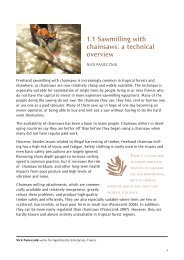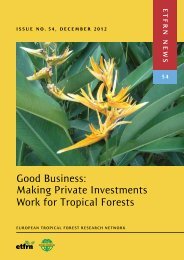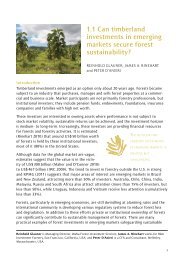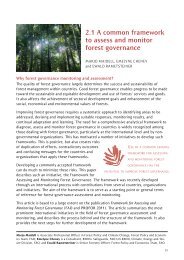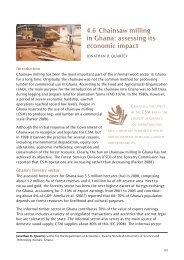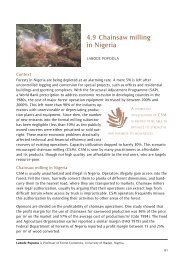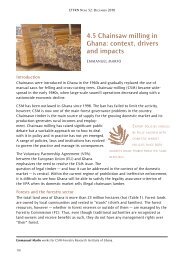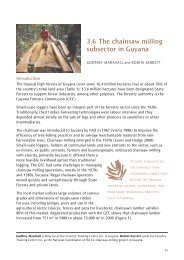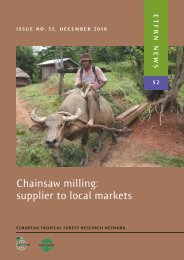Chainsaw milling: supplier to local markets - European Tropical ...
Chainsaw milling: supplier to local markets - European Tropical ...
Chainsaw milling: supplier to local markets - European Tropical ...
Create successful ePaper yourself
Turn your PDF publications into a flip-book with our unique Google optimized e-Paper software.
140<br />
ETFRN NEws 52: DEcEmbER 2010<br />
in one community forest in south province, the community forestry association (CFa)<br />
had entered in<strong>to</strong> a relationship with a company from Douala. The company was illegally<br />
building roads and using heavy equipment, both of which were prohibited. it was also<br />
transporting logs <strong>to</strong> Doaula for processing, which was also<br />
illegal.<br />
uneasy and unequal relationships<br />
relationships between communities and companies are<br />
complex and variable. in some cases, communities<br />
establish a relationship with a company when they initiate<br />
a community forestry application. in others, <strong>local</strong> elites<br />
who were involved in establishing the community forest set<br />
up contacts with logging companies <strong>to</strong> carry out the actual<br />
logging. sometimes companies approach community forest<br />
associations after a community forest is in place <strong>to</strong> propose<br />
logging operations. This situation was common in the community forests in East province,<br />
where communities had assistance from international agencies <strong>to</strong> establish their forests<br />
and did not already have a relationship with a company.<br />
Costs and benefits<br />
Communities and companies see both benefits and costs from their relationship. in cases<br />
where relationships are established at the outset, the company often funds the entire<br />
endeavour, from the application process through <strong>to</strong> the logging and processing activities,<br />
as well as the sale of the sawnwood for export <strong>to</strong> the region (and occasionally even<br />
Europe). if the relationship is established later, the company is usually responsible for<br />
supplying the logging equipment (such as chainsaws and <strong>milling</strong> equipment) and covering<br />
the costs of logging operations (including labour) and transportation. Communities<br />
usually receive no lasting benefit in terms of capacity or equipment for future logging<br />
activities once the company leaves.<br />
CFas can also earn revenue from working with a company. The company and those<br />
responsible for the community forest negotiate a volume-based fee for the amount of<br />
wood felled and processed. The amount <strong>to</strong> be paid is usually calculated based on the<br />
volume of sawnwood that the company actually transports. The revenue that communities<br />
obtain from their partners varies considerably. The highest payment per cubic meter (m 3 )<br />
was us$80 in East province; the lowest were in south and southwest provinces, where a<br />
number of village chiefs reported that the community received only us$2 per m 3 .<br />
another benefit for CFas is access <strong>to</strong> buyers and timber <strong>markets</strong>. The CoDEVir<br />
community forest had difficulties in finding a profitable market for its sawnwood; while it<br />
was possible <strong>to</strong> sell <strong>local</strong>ly, members were not able <strong>to</strong> make a profit based on <strong>local</strong> prices.<br />
They did not have the contacts <strong>to</strong> find buyers in either the domestic or international<br />
<strong>markets</strong>, where the prices are higher.



